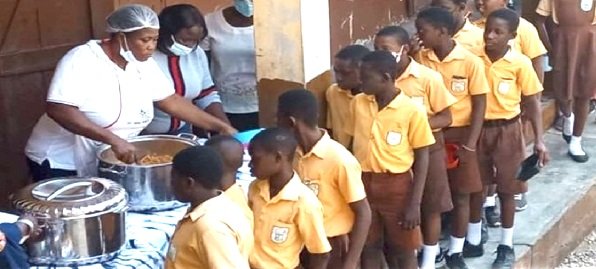Executive Director of Africa Education Watch, Kofi Asare, has renewed his call for a fundamental review of Ghana’s School Feeding Programme, cautioning that the current procurement-based structure is unsustainable and risks undermining its original vision.
Mr. Asare explained that the initiative was initially designed to be community-driven, with local participation playing a central role. However, he said this focus has diminished over time, giving way to a model overly dependent on government procurement.
“We have always recommended to the government that the School Feeding Programme cannot be sustained in its current form, being used as a procurement activity. In places where school feeding works, community participation is the foundation”
Kofi Asare, Executive Director of Africa Education Watch

Mr. Asare warned that the government’s proposed approach of paying the same rate for lunch at both basic and senior high school levels is problematic. He cited the GHS 3.00 per child proposal as a sign of inadequate differentiation in cost structure, which could place a strain on the education system.
He further pointed out the disparities in coverage, noting that while some northern communities have up to 90 percent of their schools benefiting from the programme, districts such as Ga East remain largely excluded due to their high proportion of private schools.
“We must begin to build community participation into the GHS 3.00 allocation to make it more realistic. The government alone cannot finance the School Feeding Programme”
Kofi Asare, Executive Director of Africa Education Watch

Community-Driven Solutions
EduWatch has long advocated for the restoration of community involvement in the programme. According to the organisation, when local farmers and households contribute produce alongside government funding, the quality, sustainability, and coverage of school feeding initiatives improve significantly.
Mr. Asare stressed that without this collaborative approach, the initiative risks further inefficiency and inequity. He argued that community participation not only reduces the financial burden on the state but also promotes healthier diets through the use of fresh, locally sourced food.
EduWatch maintained that the success of similar programmes in other parts of the world is tied to active local engagement, rather than “a procurement system managed solely by central authorities.” By tapping into existing community networks, Ghana’s School Feeding Programme could better meet nutritional needs while strengthening local economies.
The call for reform comes amid growing debate about the role of social intervention programmes in the country’s education sector. As the government works to address fiscal constraints, stakeholders like EduWatch are pushing for cost-effective strategies that do not compromise quality or accessibility.

While no official response has been issued by the Ministry of Gender, Children and Social Protection, which oversees the programme, the conversation around sustainability is expected to gain momentum as budgetary reviews approach.
EduWatch believes that the choice now facing policymakers is whether to continue with a procurement-heavy system that is already showing signs of strain, or to transition towards a hybrid model that prioritises community input.
For Mr. Asare, the answer is clear – reviving the original community-driven structure is the surest way to protect the integrity and future of the School Feeding Programme.
READ MORE: Nigeria’s Top Indigenous Oil Producers Surge Output in H1 2025



















